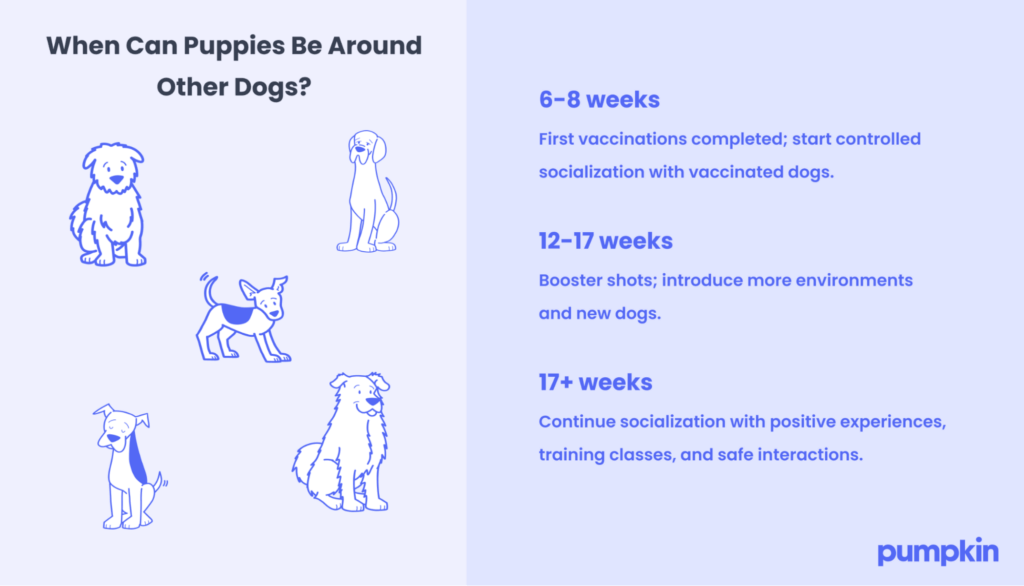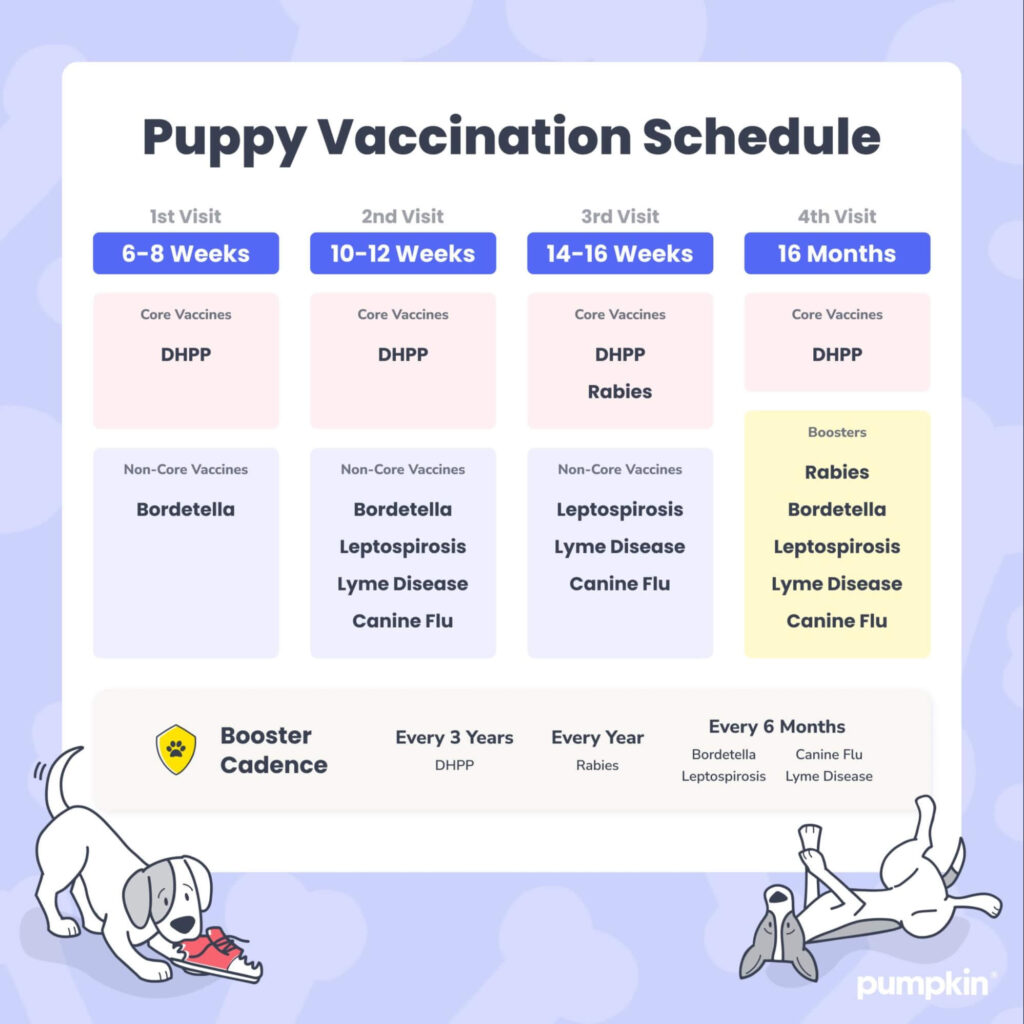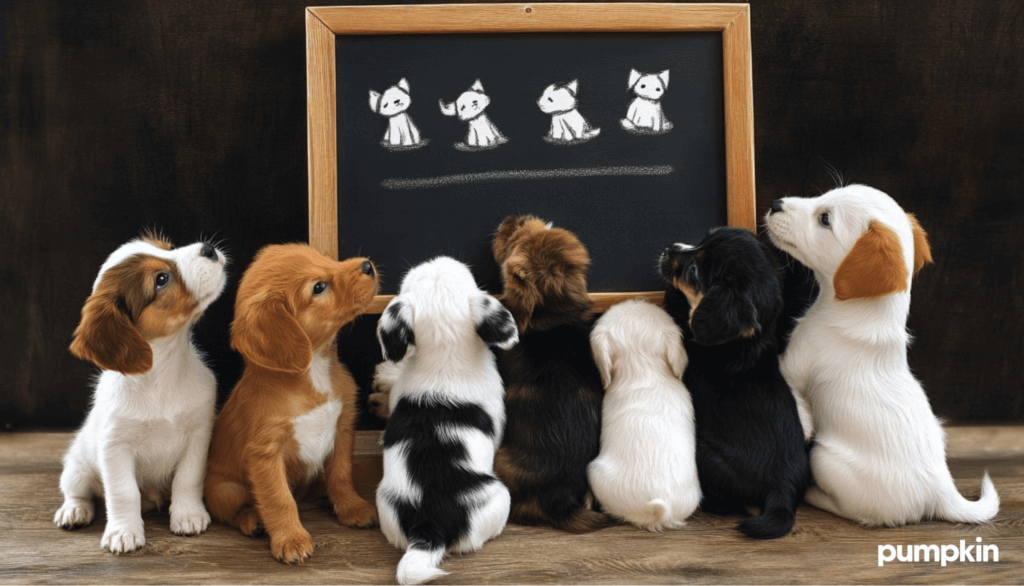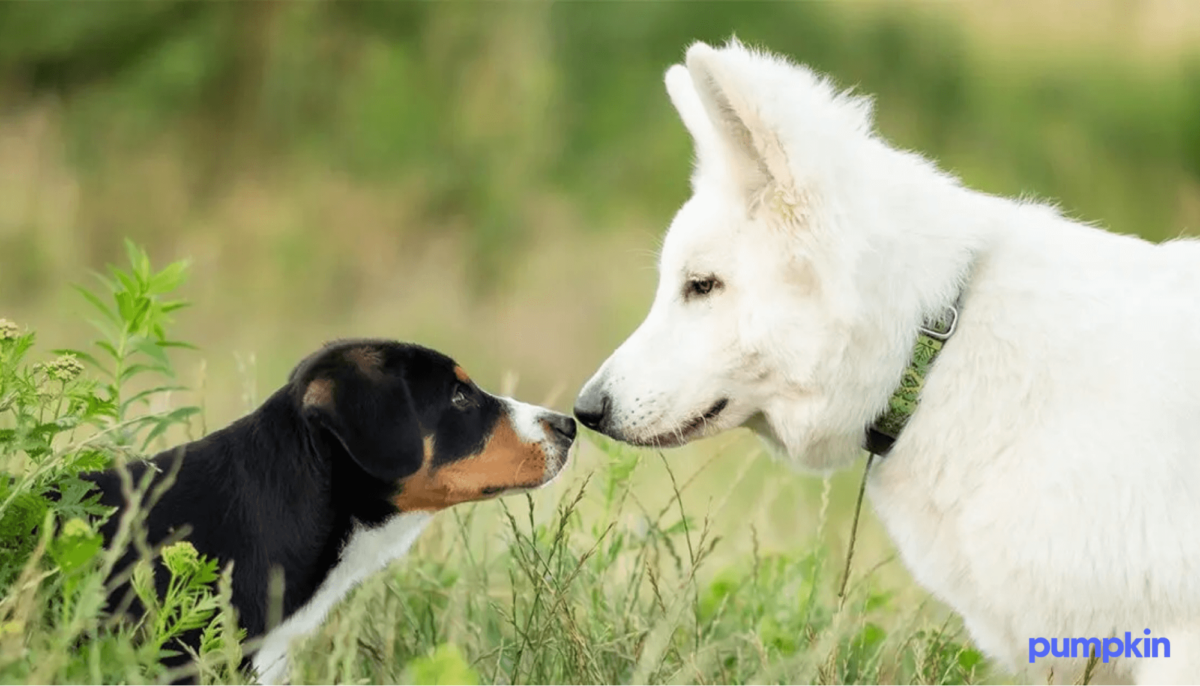Key Points
- Puppies should get their first round of vaccinations before freely socializing with dogs outside the family.
- Socialization with other people and animals is crucial during your puppy’s first 3 months of life; you must balance their exposure to disease with the need to explore the world.
- Socialize your puppy safely in controlled environments, like playdates with vaccinated dogs and puppy classes with strict vaccination rules.
- Avoid dog parks, pet stores, and unfamiliar dogs until your puppy is vaccinated.
Can’t wait to show your new puppy off to the world? As a responsible pet parent, you need to hold your horses (or puppies) — at least ‘til they get their first round of shots. In the meantime, we strongly recommend filling up your Instagram feed with as many puppy pictures as possible.
Your puppy will receive some antibodies and immune defense from their mother, but vaccinations are the most important defense against diseases and parasites. So does that mean your puppy should be 100% vaccinated before meeting other dogs? Not quite. Early socialization is the foundation of a confident and well-adjusted adult dog.
This requires a balancing act. So, how can you give your puppy the best start in life without putting them in harm’s way? Here’s how to keep your new puppy safe as they explore the world and meet other dogs.
When can your puppy be around other dogs?
As a general rule of thumb, your puppy should be vaccinated before meeting most dogs. This means they should be around 8 weeks old (after they finish their first round of vaccines) before interacting with the rest of the local canine crew.

What about other dogs in the household?
It’s relatively easy to keep your puppy away from strange dogs by avoiding dog parks, doggy daycare, and training classes. But when can your new puppy meet other dogs already living in your household? So long as your other dogs are fully vaccinated and healthy, it’s usually safe to introduce them to your new puppy before they’re vaccinated. Your puppy can also safely play with their litter mates.
If any of your dogs are displaying symptoms of kennel cough or influenza, keep them quarantined until they’re no longer contagious and your new pup has had their core puppy vaccines.
Puppy vaccination
Those first few weeks are a critical period for your puppy’s health. While their mother’s milk provides antibodies that keep them safe from illness, it’s not enough for long-term protection once they’re weaned. That’s why puppies need vaccinations.
Pet Pro Tip: Illnesses won’t wait to happen. It’s never too early to enroll in pet insurance. From common parasite infections, to costly hereditary illnesses, pet insurance can be worth it and can cover crucial eligible treatment your pet may need for their unexpected accidents and illnesses. Find out how pet insurance works, what pet insurance covers, and choose a plan today.
Puppies typically get their first vaccine shots around 6-8 weeks old, followed by boosters every 3-4 weeks until they reach 16-17 weeks. After that, they’ll need regular boosters every 6 or 12 months.
These vaccinations protect them from common and potentially deadly puppy illnesses, like Parvovirus, Distemper, Leptospirosis, and parasites. Parvo is especially notorious for remaining active for up to a year — even a quick sniff is enough for your puppy to contract this virus.
Sticking to your puppy’s vaccination schedule is crucial for keeping your puppy safe from these awful diseases. Once they have completed their first vaccinations, they can start exploring the world more freely.
Puppy emergencies can be unpredictable and costly. Learn more about how a Pumpkin puppy insurance plan can help cover eligible vet bills and make it easier to give your pup the best care.

Puppy socialization
Puppies go through an important socialization period between 3 and 12 weeks of age. During this time, they’re the most receptive to learning about the world around them and developing positive associations with other dogs and people.
Believe it or not, behavioral issues, not infectious diseases, are the leading cause of death for dogs under three years old. So, proper socialization is key to preventing fear-based behaviors, aggression, and anxiety later in life.
Allowing them the freedom to experience positive interactions with other dogs, meet new people, and experience new sights, sounds, and smells, helps them gain the confidence and social skills they need to become the confident adult dog you know they can be.
But here’s the catch: If your puppy’s health is at risk until they’ve completed their vaccinations, how can you safely socialize them?
Start early, but prioritize safety: Begin socializing your puppy as soon as they come home, but stick to controlled environments: your home, the homes of friends with vaccinated dogs, or puppy classes with strict vaccination requirements.
Gradual introductions: Introduce your puppy to new dogs and environments gradually, starting with short, controlled interactions. Always be there to supervise a first playdate.
Safe social circles: Before completing their first round of vaccinations, puppies should only socialize with their littermates, fully vaccinated dogs in your household, and fully vaccinated dogs in a controlled setting.

How to keep your puppy safe around other dogs
When planning your puppy’s first meet-cutes with other dogs, follow these golden rules for safe interactions and positive experiences:
1. Stay away from dogs you don’t know
Think of yourself as your puppy’s personal bodyguard. Always keep your distance from unfamiliar dogs at first. These dogs may not be vaccinated and could be carrying contagious diseases without showing symptoms. Even if they are friendly and vaccinated, their size or play style could injure your puppy by accident.
2. Avoid the dog park and pet stores
While these may seem like puppy paradise, avoid dog parks and pet stores like the plague! These high-traffic areas increase your puppy’s risk of exposure to diseases and parasites.
Unfortunately, not all dog owners are responsible about vaccinations, and you can’t guarantee that every dog at the local dog park is healthy. Dog parks can become breeding grounds for germs and illnesses. Dog parks can also harbor parasites like roundworms, hookworms, and whipworms, which can be transmitted through feces.
3. Set vetted playdates
As your puppy’s official social coordinator, it’s important to be selective when setting up playdates. Here’s the guest list criteria:
- Fully vaccinated
- Healthy
- Friendly and gentle
Playdates should take place in a safe, controlled environment like your home or a fenced yard. If your neighbor has a friendly, vaccinated dog, that’s a great place to start. Just remember to supervise their interactions and be ready to step in and separate the dogs if things get too wild.
Tip: Keep your puppy on a leash and watch your pup’s body language. Separate them if they’re showing signs of fear, apprehension, or aggressiveness.
4. Consider a puppy training class
Looking for a fun and effective way to socialize your puppy and teach them essential life skills?
What better way to socialize your puppy and teach them important life skills than puppy training classes? These classes provide structured socialization opportunities with other puppies around the same age range and with similar vaccination status.
The most reputable puppy obedience classes will require immunization records and sterilize the dog areas between classes. Plus, they’ll help you teach those essential obedience commands (which, let’s be honest, makes your life a whole lot easier).
Generally, you can enroll your puppy 1 week after their first vaccinations.

The ground is lava for unvaccinated puppies
Remember that childhood game of hopping from furniture to furniture to avoid touching the floor? For unvaccinated puppies, the whole world can feel like lava.
Be an advocate for your puppy during this period — create safe zones, choose playmates wisely, and remove them from potentially dangerous situations (or lava flows).
Remember, you’re not alone! Your vet is the best co-pilot in this puppy adventure, so don’t hesitate to rely on their expertise and guidance.
FAQs
- https://www.vet.cornell.edu/departments-centers-and-institutes/riney-canine-health-center/canine-health-information/how-long-should-puppies-stay-their-mother
- https://www.preventivevet.com/dogs/puppy-vaccine-schedule
- https://reginahumanesociety.ca/programs-services/alternatives-to-admission/dog-behaviour-tips/puppy-developmental-stages-and-behaviour/
- https://avsab.org/wp-content/uploads/2018/03/Puppy_Socialization_Position_Statement_Download_-_10-3-14.pdf
- https://ahi.org/parasites-dog-parks-what-you-need-to-know/
- https://www.akc.org/expert-advice/training/start-training-your-puppy/
- https://bettervet.com/resources/pet-diseases/can-a-fully-vaccinated-dog-get-parvo




